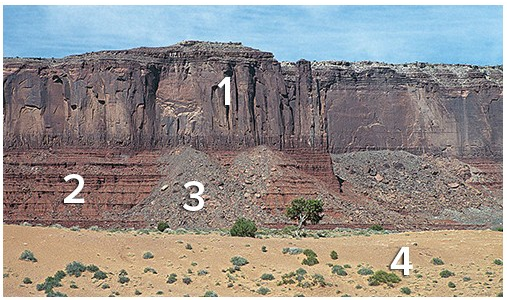Define partial melting and explain how it affects the magma composition
What will be an ideal response?
Partial melting occurs when a rock does not melt completely to form magma. Only some minerals in the rock completely melt, so the resulting magma does not have the same composition as the original rock. Partial melting typically creates magma that is relatively richer in silica than the original rock. For example, partial melting of an ultramafic rock (peridotite) forms a mafic (basaltic) magma; partial melting of a mafic rock (basalt) forms to intermediate or felsic magmas.
You might also like to view...
Which locations contain rocks that are in place (part of the bedrock)?

A) 1 and 2
B) 2 and 3
C) 3 and 4
D) 1 and 3
E) 2 and 4
Where does most of the material on the continental shelf come from?
A) Erosion from the adjacent continent B) Sediments transported from rivers C) Accumulations behind natural dams D) New crust formation
________ are characteristics of downcutting streams and a youthful stage of valley evolution.
A) Rapids and lots of whitewater
B) Meandering channels and natural levees
C) Wide floodplains
D) U-shaped, cross-valley profiles
Describe the principal characteristics of the animals of the Nearctic zoogeographic region
What will be an ideal response?